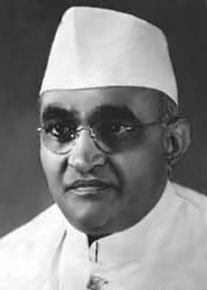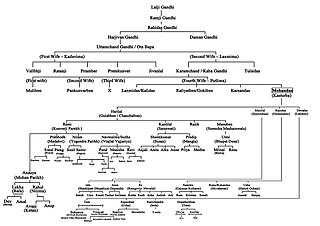Related Research Articles

Bertrand Arthur William Russell, 3rd Earl Russell, was a British mathematician, logician, philosopher, and public intellectual. He had influence on mathematics, logic, set theory, and various areas of analytic philosophy.

Frederick Charles Copleston was an English Roman Catholic Jesuit priest, philosopher, and historian of philosophy, best known for his influential multi-volume A History of Philosophy (1946–75).

Mohandas Karamchand Gandhi was an Indian lawyer, anti-colonial nationalist and political ethicist who employed nonviolent resistance to lead the successful campaign for India's independence from British rule. He inspired movements for civil rights and freedom across the world. The honorific Mahātmā, first applied to him in South Africa in 1914, is now used throughout the world.
Events in the year 1931 in India.

Kasturba Mohandas Gandhi was an Indian political activist who was involved in the Indian independence movement during British India. She was married to Mohandas Karamchand Gandhi, commonly known as Mahatma Gandhi. National Safe Motherhood Day is observed in India annually on April 11, coinciding with Kasturba's birthday.
Events in the year 1930 in India.
Events in the year 1869 in India.

Samaldas Gandhi (1897-1953) was a journalist and Indian independence activist who headed the Aarzi Hakumat or Provisional Government of the erstwhile princely state of Junagadh. He was a nephew of Mahatma Gandhi.

Karamchand Uttamchand Gandhi was a court official in Porbandar. He served as Diwan of Porbandar and Rajkot and was the father of Mahatma Gandhi.
Events in the year 1933 in India.

The 10 Rupees Postage stamp depicting Mahatma Gandhi, issued by India in 1948, is one of India's most famous stamps. On 15 August 1948, on the occasion of the first anniversary of India's Independence Day, Gandhi was honored as the first Indian to be depicted on stamps of India. A set of 100 of these stamps was overprinted with the word "Service" and provided only to the Governor General of India for his official use. The 10 Rupees "Service" overprinted stamp is one of India's rarest and most highly valued stamps.
Dinanath Gopal Tendulkar (1909–1972) was an Indian writer and documentary film maker. He is most well known as the author of an eight-volume biography of Mahatma Gandhi, titled Mahatma: Life of Mohandas Karamchand Gandhi. He was also a close associate of Vithalbhai Jhaveri and collaborated for the documentary film, Mahatma: Life of Gandhi, 1869–1948. He died on Monday, June 12, 1972.
Ram Vanji Sutar is an Indian sculptor. He designed the Statue of Unity which is the world's tallest statue with a height of 182 metres, exceeding the Spring Temple Buddha by 54 metres.
Vithalbhai Jhaveri (1916–1985) was an Indian independence activist, filmmaker, photographer, writer and a close associate of Mahatma Gandhi. He documented Gandhi, since the Dandi March till his death in 1948, through numerous photographs which were displayed at many exhibitions and used in several literary works. Gandhi-A Photo Biography, a book by Peter Rühe, uses several of his photographs and he was a collaborator of Dinanath Gopal Tendulkar, in the latter's biography of Mahatma Gandhi, Mahatma; Life of Mohandas Karamchand Gandhi. His 330-minute documentary on Gandhi, Mahatma: Life of Gandhi, 1869–1948, covers the Indian leader's life through 14 chapters. The Government of India awarded him the third highest civilian honour of the Padma Bhushan, in 1969, for his contributions to Literature and education.
Herbert Fischer (1914–2006) was a German diplomat, indologist and the ambassador of the erstwhile German Democratic Republic to India from 1972 to 1976. Fischer was born on 10 April 1914 in Herrnhut, in East Germany to a craftsman. He migrated to western Europe in 1933, where he completed his studies. Fischer moved to India in 1936, which gave him the opportunity to get acquainted with Mahatma Gandhi. After Indian independence in 1947, he returned to the German Democratic Republic, where he joined the Ministry of Foreign Affairs in 1956. He served as the Chief of the East German Trade Mission in the late 1960s, before becoming the East German ambassador to India in 1972. He was the author of many Indological books, including Mohandas Karamchand Gandhi, a biography of the Indian leader. He was a recipient of the Patriotic Order of Merit III Class. In 2003, the Government of India awarded him the Padma Bhushan, their third highest civilian honour, for his contributions to public affairs.

The Gandhi family is the family of Mohandas Karamchand Gandhi, commonly known as Mahatma Gandhi; Mahatma meaning "high souled" or "venerable" in Sanskrit; the particular term 'Mahatma' was accorded Mohandas Gandhi for the first time while he was still in South Africa, and not commonly heard as titular for any other civil figure even of similarly rarefied stature or living or posthumous presence.
The Copleston–Russell debate is an exchange concerning the existence of God between Frederick Copleston and Bertrand Russell broadcast on the BBC Third Programme on 28 January 1948 and again in April 1959. The debate centers on two points: the metaphysical and moral arguments for the existence of God. According to Graham Oppy and Nick Trakakis, the arguments used in this debate would typify the arguments presented by theists and atheists in the latter half of the 20th century, with Russell's approach often being used by atheists in the late 20th century.
This is a list of events from British radio in 1948.
References
- ↑ "1940s" (PDF). The BBC Story. BBC. Archived from the original (PDF) on 2011-12-18. Retrieved 2010-06-26.
- ↑ "Mohandas K. Gandhi: The Indian Leader at Home and Abroad". The New York Times. 31 January 1948. Retrieved 23 January 2013.